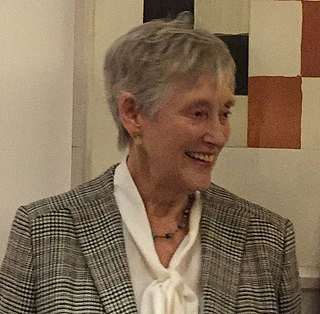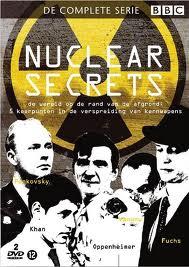Related Research Articles
The Australian Security Intelligence Organisation is Australia's national security agency responsible for the protection of the country and its citizens from espionage, sabotage, acts of foreign interference, politically motivated violence, attacks on the Australian defence system, and terrorism. ASIO is comparable to the British Security Service (MI5). ASIO is part of the Australian Intelligence Community.

Disarmament is the act of reducing, limiting, or abolishing weapons. Disarmament generally refers to a country's military or specific type of weaponry. Disarmament is often taken to mean total elimination of weapons of mass destruction, such as nuclear arms. General and Complete Disarmament was defined by the United Nations General Assembly as the elimination of all WMD, coupled with the “balanced reduction of armed forces and conventional armaments, based on the principle of undiminished security of the parties with a view to promoting or enhancing stability at a lower military level, taking into account the need of all States to protect their security.”

The Security Service, also known as MI5, is the United Kingdom's domestic counter-intelligence and security agency, and is part of its intelligence machinery alongside the Secret Intelligence Service (MI6), Government Communications Headquarters (GCHQ), and Defence Intelligence (DI). MI5 is directed by the Joint Intelligence Committee (JIC), and the service is bound by the Security Service Act 1989. The service is directed to protect British parliamentary democracy and economic interests, and counter terrorism and espionage within the United Kingdom (UK).
Special Branch is a label customarily used to identify units responsible for matters of national security and intelligence in British, Commonwealth, Irish, and other police forces. A Special Branch unit acquires and develops intelligence, usually of a political or sensitive nature, and conducts investigations to protect the State from perceived threats of subversion, particularly terrorism and other extremist political activity.

Dame Stella Rimington is a British author and former Director General of MI5, a position she held from 1992 to 1996. She was the first female DG of MI5, and the first DG whose name was publicised on appointment. In 1993, Rimington became the first DG of MI5 to pose openly for cameras at the launch of a brochure outlining the organisation's activities.

Dame Joan Mary Ruddock, is a British Labour Party politician who served as the Member of Parliament (MP) for Lewisham Deptford from 1987 to 2015. Ruddock was Minister of State for Energy at the Department of Energy and Climate Change until 11 May 2010. She stood down at the 2015 general election.

Catherine Margaret Ashton, Baroness Ashton of Upholland, is a British Labour politician who served as the High Representative of the Union for Foreign Affairs and Security Policy and First Vice President of the European Commission in the Barroso Commission from 2009 to 2014.

Bruce Kent is a British political activist and a retired Roman Catholic priest. Active in the Campaign for Nuclear Disarmament (CND), he was the organisation's general secretary from 1980 to 1985 and its chair from 1987 to 1990. He now holds the honorary title of vice-president. In 1960 he joined the Christian Campaign for Nuclear Disarmament, a specialist section of the Campaign for Nuclear Disarmament.

Christopher Maurice Andrew, is an Emeritus Professor of Modern and Contemporary History at the University of Cambridge with an interest in international relations and in particular the history of intelligence services.
The Portland Spy Ring was a Soviet spy ring that operated in England from the late 1950s to 1961, when the core of the network was arrested by the British security services. It is one of the most famous examples of the use of resident spies, who operate in a foreign country without the cover of their embassy. Its members included Harry Houghton, Ethel Gee, Gordon Lonsdale, and the Americans Morris and Lona Cohen.
Ethel Elizabeth Gee, nicknamed "Bunty", was an Englishwoman who helped her lover spy for the Soviet Union. She was a minor member of the Portland Spy Ring.
The Coalition for Peace Through Security (CPS) was a campaigning group founded in September 1981 and active in the UK throughout the early and mid-1980s. It strongly opposed unilateral nuclear disarmament and withdrawal from NATO as advocated by the Campaign for Nuclear Disarmament, supporting instead the replacement of Polaris by Trident and the deployment of NATO cruise missiles after the Soviet Union began deploying its SS20 missiles in 1977. The basis of the CPS case was set out in detail in a book published towards the end of the campaign, Paul Mercer's "Peace" of the Dead, and many of its arguments at the time can still be found on the website of Julian Lewis, formerly its Research Director.

Hugh Gater Jenkins, Baron Jenkins of Putney, was a British Labour politician, campaigner and member of Parliament (MP) and the House of Lords.

The Directorate of Military Intelligence is the military intelligence branch of the Defence Forces, the Irish armed forces, and the national intelligence service of Ireland. The organisation has responsibility for the safety and security of the Irish Defence Forces, its personnel, and supporting the national security of Ireland. The directorate operates domestic and foreign intelligence sections, providing intelligence to the Government of Ireland concerning threats to the security of the state and the national interest from internal and external sources.

The Public Security Intelligence Agency is the national intelligence agency of Japan. It is administered by the Ministry of Justice in the government of Japan, and is tasked with internal security and espionage against threats to Japanese national security based on the Subversive Activities Prevention Act and the Act Regarding the Control of Organizations Which Committed Indiscriminate Mass Murder. Any investigation conducted by the agency needs to go through the Public Security Examination Commission (PSEC) in order to determine if there is a justification to investigate and clamp down on an organization's activities.
Pat Arrowsmith is an English author and peace campaigner. She was a co-founder of the Campaign for Nuclear Disarmament.

Nuclear Secrets, aka Spies, Lies and the Superbomb, is a 2007 BBC Television docudrama series which looks at the race for nuclear supremacy from the Manhattan Project through to Pakistan's nuclear weapons programme.
During the Cold War (1947–1991), when the Soviet Union and the United States were engaged in an arms race, the Soviet Union promoted its foreign policy through the World Peace Council and other front organizations. Some writers have claimed that it also influenced non-aligned peace groups in the West, although the CIA and MI5 have doubted the extent of Soviet influence.

The Campaign for Nuclear Disarmament (CND) is an organisation that advocates unilateral nuclear disarmament by the United Kingdom, international nuclear disarmament and tighter international arms regulation through agreements such as the Nuclear Non-Proliferation Treaty. It opposes military action that may result in the use of nuclear, chemical or biological weapons and the building of nuclear power stations in the UK.

Percy Eded Glading was an English communist and a co-founder of the Communist Party of Great Britain (CPGB). He was also a trade union activist, an author, and a spy for the Soviet Union against Britain, an activity for which he was convicted and imprisoned.
References
- 1 2 Andy McSmith No Such Thing As Society, Constable & Robinson, 2010, p.63-64
- ↑ "Myths and Misunderstandings". Mi5.gov.uk. Archived from the original on 2011-01-06. Retrieved 2011-01-09.
- ↑ "Secret State: Timeline". BBC News. 2002-10-17. Archived from the original on 2005-09-22. Retrieved 2011-01-09.
- ↑ "Dale Campbell-Savours, MP, in Hansard, 24 July 1986". Hansard.millbanksystems.com. Archived from the original on 2011-09-21. Retrieved 2011-01-09.
- ↑ James Rusbridger The Intelligence Game: The Illusions and Delusions of International Espionage, London: I.B. Taurus, 1991, p.208. Originally published by The Bodley Head in 1989.
- ↑ Bateman, D., The Trouble With Harry: A memoire of Harry Newton, MI5 agent Archived 2013-07-29 at the Wayback Machine , Lobster, Issue 28, December 1994. Accessed 3 November 2011.
- ↑ Christopher Andrew The Defence of the Realm: The Authorized History of MI5, London: Penguin, 2012, p.1305
- ↑ Richard Norton-Taylor "Truth, but not the whole truth" Archived 2017-03-11 at the Wayback Machine , The Guardian, 11 September 2001